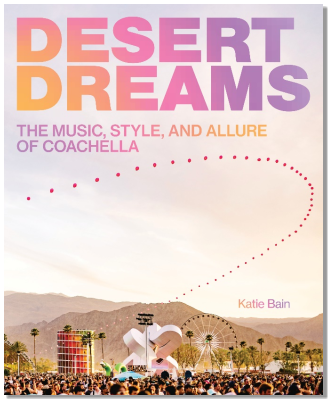It’s a balmy summer afternoon when I enter Make Manifest, a boutique and vegan café on Tompkins Avenue in Bedford-Stuyvesant. The space, which is also a community hub regularly has guests lounging, shopping, and perusing, has a mercurial energy within it. For many of my visits, I’m always struck by how you might come across a musician, an artist, or perhaps a designer who all live within walking distance of the store. Inside Make Manifest, which sits across the street from Peace & Riot and Peaches Hothouse, which are both Black-owned, and other cafés, as well as restaurants, conversations are typically comforting and free of the anxiousness that is central to Manhattan. And that’s due to Tompkins Avenue and Bed-Stuy being a hotbed for creativity and Black entrepreneurship.
Upon my arrival, I walk over to a second space separate from the store’s main retail location where Make Manifest’s owner, Isha Ma’at, 41, and a mother of three, is sitting. Her warm presence is what I predict keeps people coming back to both spaces. This additional area serves as a location for pop-ups, which supports entrepreneurs looking for retail exposure and even sewing courses for individuals of all ages. Make Manifest’s culture director, Anthony Ogunlanoh, who is also the designer behind Muddaland, regularly teaches courses and commissions artists like KeiYya to perform inside the store. These activations uplift brands, local artists, and also showcase how Make Manifest is a part of the cultural heartbeat of Bed-Stuy.
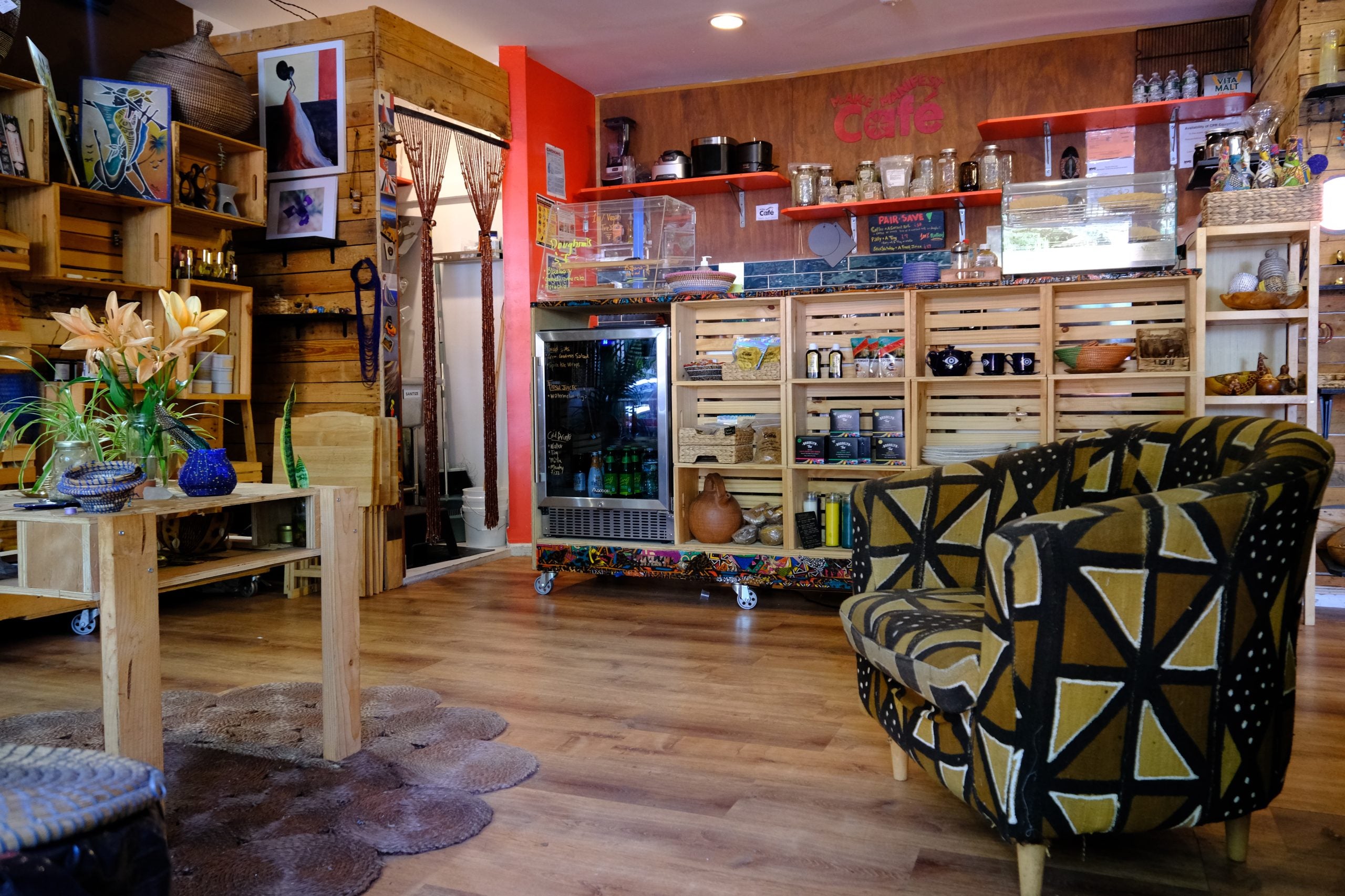
To many, gentrification is a looming buzzword that comes to mind when one thinks of Bed-Stuy as of late. Longtime Black residents have had to grapple with rising rent prices–and similarly, business owners have had to cope with the same for their retail locations. Tompkins Avenue is well known for its stretch of Black women-owned stores. Beginning in 2011, the stretch became home to businesses that would lead to a slew of newer residents, both Black and white.
Historically, Bed-Stuy was a hub bustling with Black creativity on display, it’s even been referred to as a “Black Utopia.” Decades ago, Bed-Stuy was home to Black-owned art centers, the International African Art Festival, a bookstore, a jazz lounge, a food co-op, a publishing company, a record label, and more, which were developed by The East, an organization and meeting place founded by Jitu Weusi. The East held principles including unity, creativity, cooperative economics, and the belief in community-building, which are part of the Nguzo Saba. The East’s legacy still lives on in Bed-Stuy today. “The Sun Rises in The East,” a documentary by Tayo and Cynthia Gordy Giwa presents these notions in detail. (The East closed its doors in 1985.)
Aside from it being a part of the ongoing Black business boom on Tompkins Avenue, Make Manifest, which opened in 2017, is a mainstay due to the curation within the shop. Since Isha is a designer herself, Make Manifest often has her pieces for sale: merchandise including bucket hats and tote bags emblazoned with terms like “Asé” and “Bed-Stuy Brooklyn.” A straw hat with the phrase “Blooming” is one of her newer designs—Isha happens to be wearing one of these hats in a textured brown hue when we meet. Ogunlanoh’s pieces are also sold in the store. His Nigerian roots have led him to create eccentric denim hats and hand-dyed denim pants.
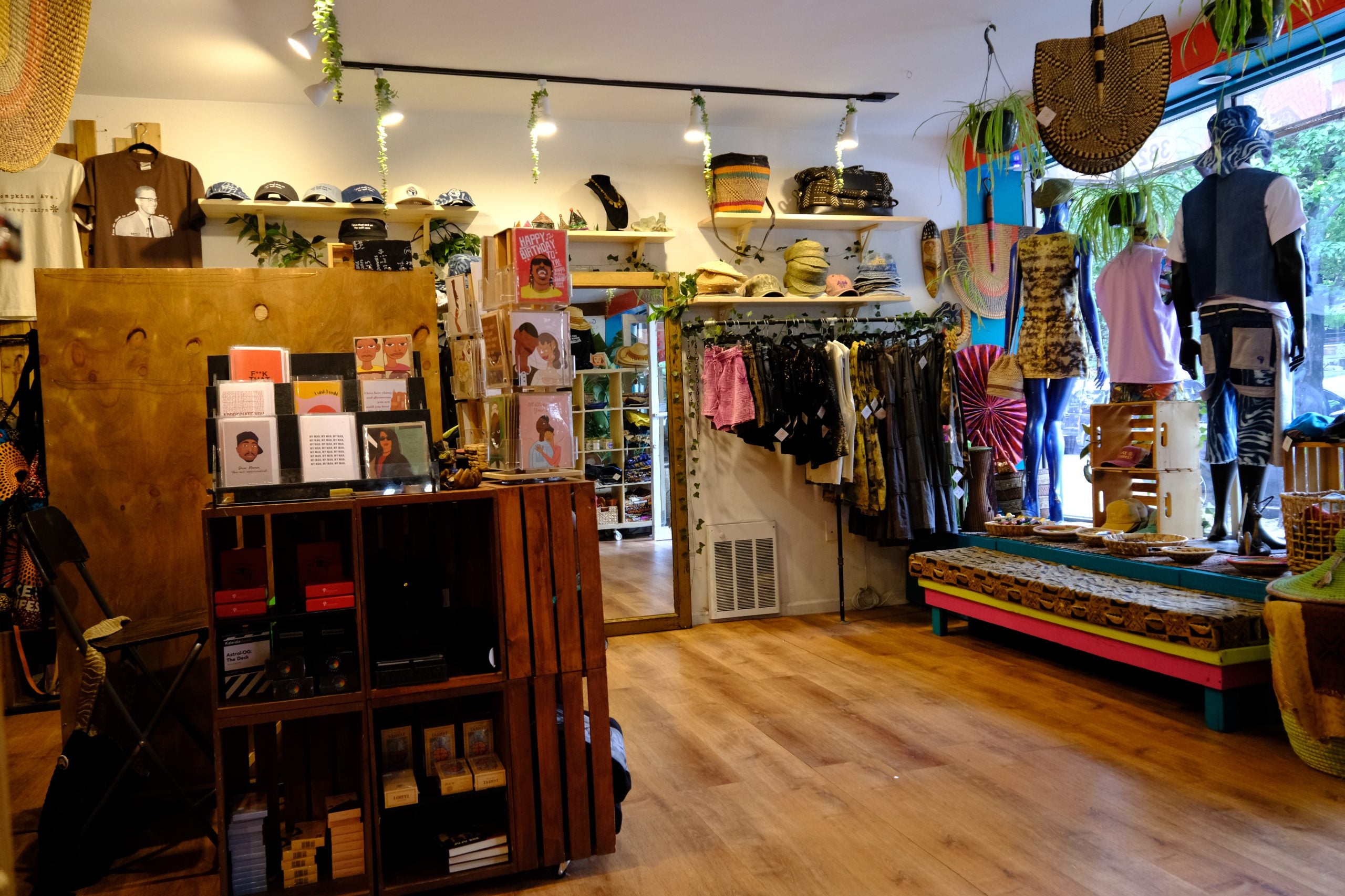
Stores like Peace & Riot, Bed Vyne Wine, Brooklyn Kettle/Narrative, and Sincerely, Tommy have contributed to the sense of creative energy on the street. Isha’s brainchild is in that number. While the area is currently bustling with businesses, according to Ma’at, years ago it wasn’t. Even though it still had a bit of charm, to her, she recalls it feeling like a “small town inside of [a] big city.”
Originally from Grenada, Ma’at relocated to Washington, D.C., with her mother when she was eight. She tells me that due to her upbringing, she has always cared about communal spaces and community. “I always wanted a store,” Isha expresses. By 19, she was living in Brooklyn–she tells me that at this age, she was also largely attracted to Bed-Stuy despite living in Flatbush. Eventually, she moved to Bed-Stuy, but it would be quite some time before the store was created.
Isha says that she believes she manifested what the shop has transformed into. Ma’at told me that years ago she would sell her designs and items by local designers at festivals, including AfroPunk, before Make Manifest officially opened. This level of curation would later become intrinsic to the boutique.
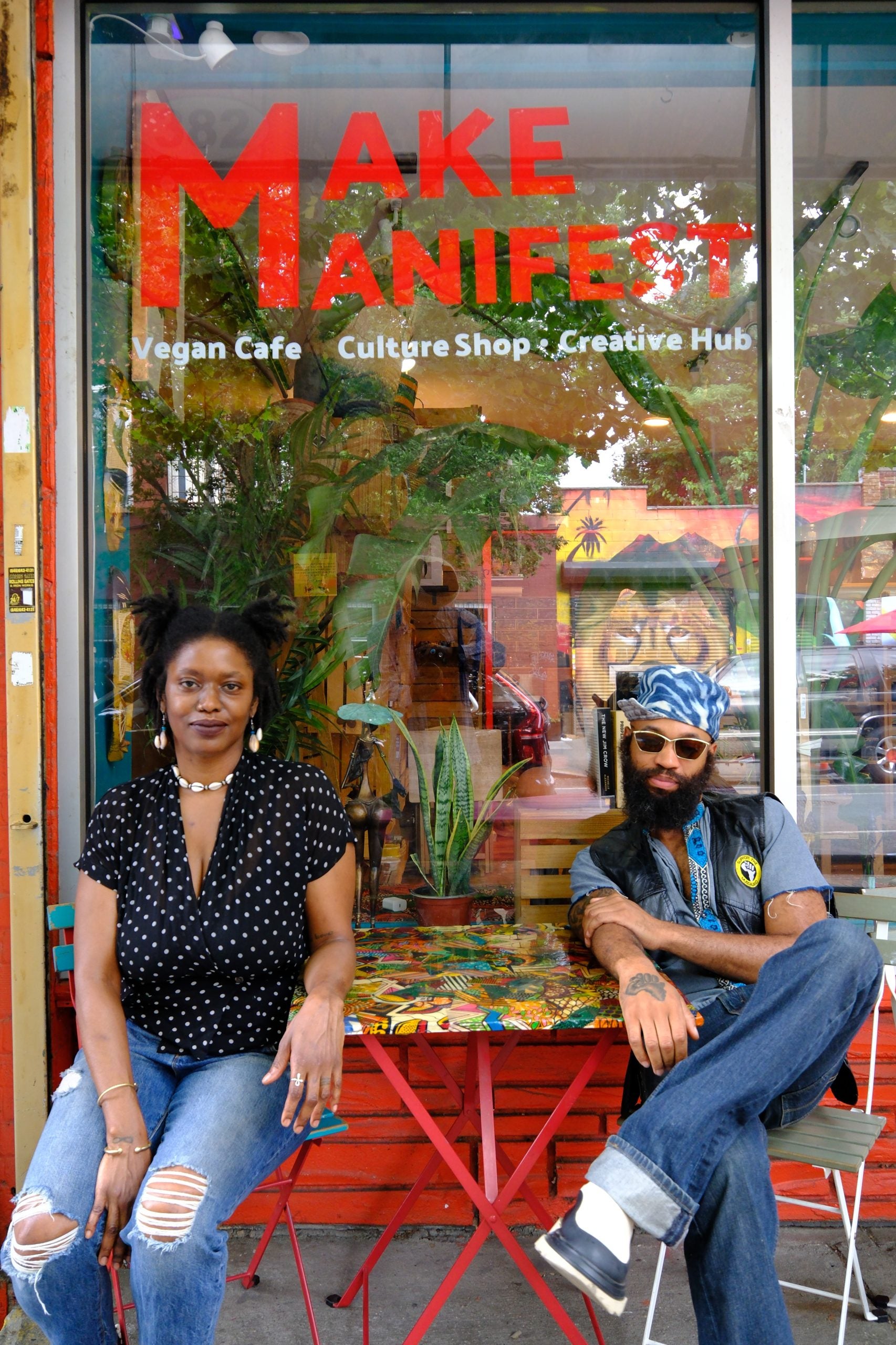
Pre-2017, since Bed-Stuy was a bit different demographically, according to Isha, she would often team up with other business owners to vend at local events and holiday pop-ups, Khadija Tudor of the Life Wellness Center, and fashion designer Hekima Happa. Naturally, conversations began spurring up about Isha having a space of her own to fully actualize her dreams of opening a store. She says she launched a GoFundMe and was set on the space that is now Brooklyn Kettle/Narrative. However, she was unable to move forward with renting it out due to financial reasons.
Isha, Hekima, and Khadija would later open Make Manifest in December 2017 as co-owners. Ma’at tells me that upon its launch, the customer base of the store was largely Black women. Back then, the store didn’t just serve as a retail space; it was also a safe space for guests. During its earliest stages, Make Manifest was organically offering visitors a sense of contributing economically to Brooklyn’s Bed-Stuy due to the clothing offered within the store. “We use a cooperative economics kind of process,” Khadija explained in a previous interview with Black-Owned Brooklyn. (Hekima and Khadija are no longer co-owners.)
As the years have progressed, the space which now encompasses a boutique and café is now a one-stop shop for individuals of all ages searching for camaraderie, vegan food, or perhaps updates to their wardrobe. Passing through might lead you to discover items by the lifestyle brand Bedstuyfly or handmade beaded pieces by Angel’s Jewelry. No matter what you are searching for, you will leave filled up in some capacity.
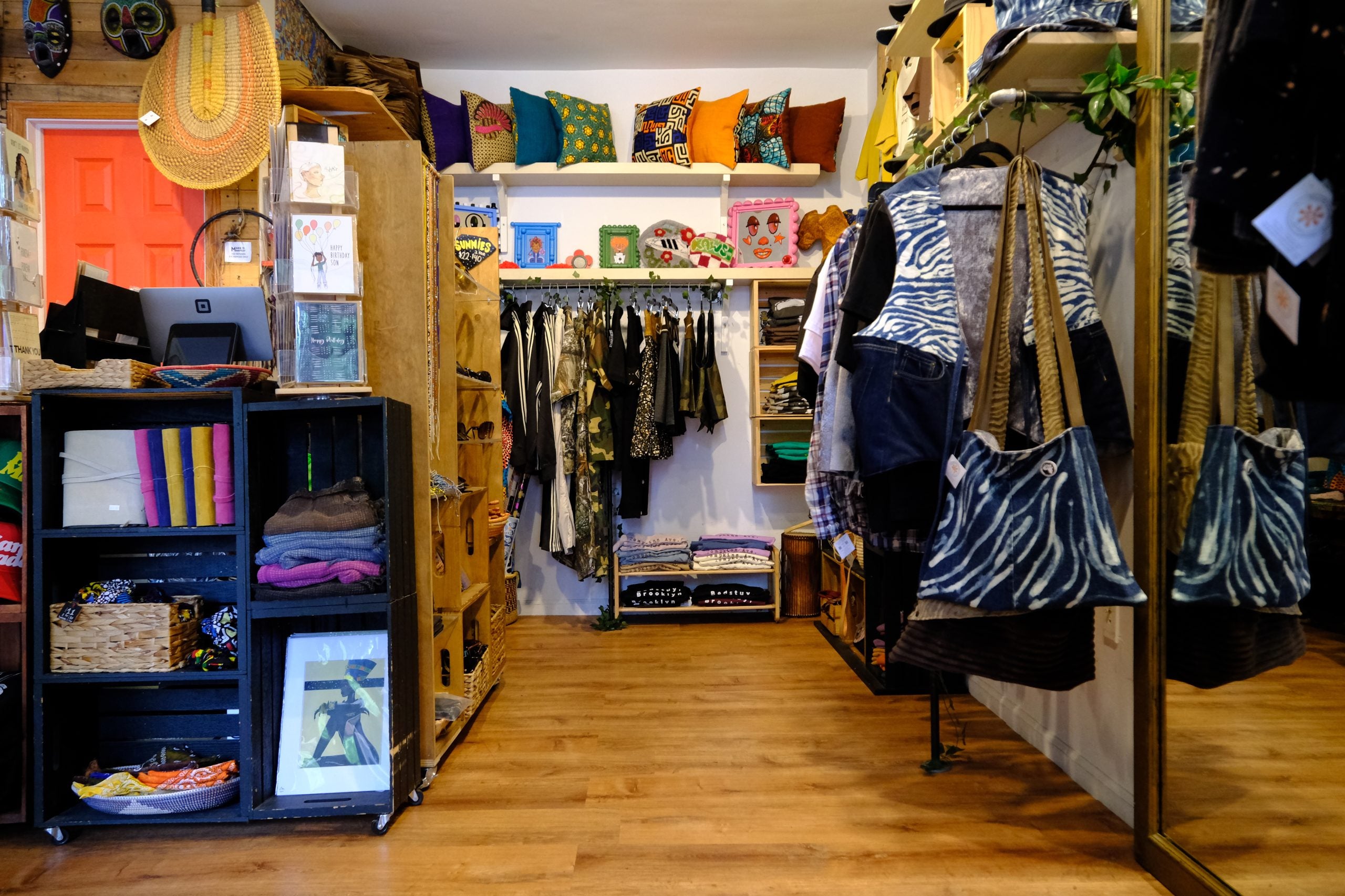
In 2021, Ogunlanoh, who’d moved to Brooklyn from North Carolina, was looking for a store to sell his brand Muddaland. He has been integral to the organic growth of the space since then. Not only are his clothes available for sale, but Anthony also pours his interests and creative inclinations into the space as he works alongside Isha. Whether booking artists or teaching classes on sewing, Ogunlanoh was able to cultivate his creative career on his own terms.
Children have always been welcome into the store, too. To Isha, this was important, especially since she’s a mother herself. A summer creative intensive, which will feature sewing, painting, jewelry making, and woodworking for kids, is on the horizon. Activities like these being offered to youth present the level of intentionality behind Make Manifest. Ma’at is offering children autonomy and projects to further explore inclinations that might activate future career paths.
“Make Manifest is about a feeling,” Isha shares toward the end of our conversation. This ideal rings true, especially in a time where diversity is often a hot-button topic. In the wake of gentrification and rising rents, it’s important and empowering to see a space like Make Manifest thriving and contributing to Bed-Stuy in real-time. Especially with the tremendous strides which can be traced back to The East.

